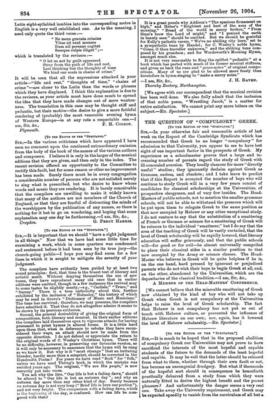Silt,—In your otherwise fair and reasonable article of last week
on the Report of the Cambridge Syndicate which has recommended that Greek be no longer " compulsory " for admission to that University, you appear to me to have lost sight of one important factor in the prospects of Greek. My experience as a schoolmaster proves that a large and in- creasing number of parents regard the study of Greek with ill-concealed aversion. They loudly clamour for more "directly useful" studies ; they ignorantly declaim against Greek as tiresome, useless, and obsolete ; and I take leave to predict that if this Report is accepted the number of boys who will continue to study Greek will in a very few years consist of candidates for classical scholarships at the Universities, of prospective clergymen, and of very few besides. The Head- Masters of public schools, not to mention the smaller grammar schools, will not be able to withstand the pressure which will be put upon them to relegate Greek to the same position as that now occupied by Hebrew or any other exceptional study. I do not venture to say that the substitution of a smattering of French or German or science for a smattering of Greek will be ruinous to the individual "smatterer," but I do say that the area of the teaching of Greek will be vastly curtailed, that the level of Greek scholarship will be rapidly lowered, that literary education will suffer grievously, and that the public schools will—for good or for evil—be almost universally compelled to place their classical sides in a similar position to that now occupied by the Army or science classes. The Head- Master who believes in Greek will be quite helpless if he is, on the one hand, hard pressed by ignorant or prejudiced parents who do not wish their boys to begin Greek at all, and, on the other, abandoned by the Universities, which are the depositaries of the classical tradition.—I am, Sir, &c., A MEMBER OF THE HEAD-MASTERS' CONFERENCE.
[We cannot believe that the miserable smattering of Greek now obtained by the kind of boy who will not take up Greek when Greek is not compulsory at the Universities helps to raise the level of Greek scholarship. The fact that Hebrew is not compulsory has not put us out of touch with Hebrew culture, or prevented the influence of Hebrew literature on our own ; nor, again, has it lowered the level of Hebrew scholarship.—En. Spectator.]
[TO THE EDITOR OP THE " SPECTATOR:1














































 Previous page
Previous page